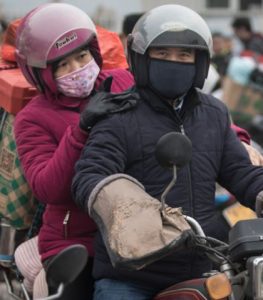Migrant workers deserting Chinese cities
A massive reverse migration trend is underway in China with the COVID pandemic driving millions of urban workers back to their home towns and villages, new data shows.
The latest figures from China’s statistics bureau show millions of Chinese people did not go back to urban areas for work after the coronavirus pandemic last year.
 And economists say reverse migration will pick up pace in coming years, partly because many workers cannot afford city housing and do not have access to city healthcare
And economists say reverse migration will pick up pace in coming years, partly because many workers cannot afford city housing and do not have access to city healthcare
This trend may have implications for China’s overall economic growth.
Economists say an aging population, high living costs and new remote businesses models are also contributing to the reversal of a rush to big cities that has defined China’s economic expansion over the last few decades.
Statistics from the end of March show there were still 2.46 million fewer migrant workers than the same period in 2019.
A major in the trend is ageing with the share of migrant workers over 50 more than doubling over the last 12 years to 26 per cent.
And the data shows that rather than traveling to China’s biggest cities like Beijing or Shanghai, more migrant workers are staying closer to home, often in the same province
And government policy has contributed to the trend as well.
As the state loosened its grip on the economy in the last few decades, tens of millions of Chinese people pursued jobs in big cities such as Beijing and Shenzhen. Local governments built up subways and other urban infrastructure to support growth.
But many migrants faced tough working conditions as labourers in factories or, more recently, couriers for China’s e-commerce giants.
A stringent residency system — called “hukou” — prevented migrants from accessing public health care and schools, or buying property in their city of work.
The flood of people contributed to a drain on local resources, prompting authorities to evict migrants.
China has tried other kinds of urbanisation — building up infrastructure in rural areas. These efforts fed into Beijing’s goal of alleviating extreme poverty, a pledge the government claimed it fulfilled last year.
Official figures showed that last year 1.6 million more people than in 2019 returned to the countryside to start businesses, helped by subsidies.
Slightly more than half of the entrepreneurial projects were built around livestreaming and other online methods to sell products, an official report said.
Many people outside big cities are taking jobs in this so-called digital economy, since they can work remotely for companies that may still be based in urban downtowns.
Qingtuanshe, a job search platform within the Alipay mobile app, said that in the last year, there’s been a significant increase in postings for livestream hosts and related jobs. The company added the share of workers for these jobs from tier three and tier four cities has increased.
Reports from government-related agencies indicate the digital economy has grown to contribute to well over one-third of total GDP, while more than 50 million people in rural areas became internet users last year.
But it’s still unclear how much the digital economy can contribute to growth.
Retail sales have risen more slowly than expected, and the share of online sales has stagnated.
Economists say that for the majority of workers who are less educated, moving to smaller cities or back to the countryside can reduce living costs. But salaries are lower, contributing to China’s growing income inequality.
Analysts with Chinese investment bank CICC said in a report this month that in the low-end labour market, both the unemployment rate and job-seeking rate have risen since the pandemic, reflecting a disconnect between employers and workers.
Official data showed that while the unemployment rate — based on a survey of only urban residents — ticked lower to 5% in May, cities had created 230,000 fewer jobs for the year so far versus the same period in 2020.












